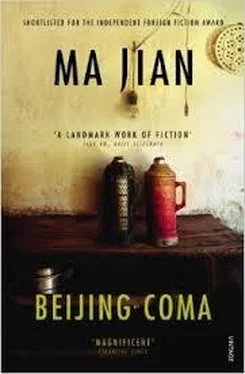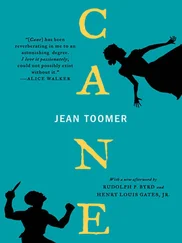‘The university’s given me an authorisation letter, so I can apply for a passport now, if I want to,’ I said. ‘They’ve told me I can go to my local police station and fill out the forms.’
‘The universities are issuing those letters to all the student leaders,’ she said. ‘It will be much easier for the government if you all leave the country.’ Then she stared into the sky and said, ‘When I look at the moon, I get an ominous feeling. It has shone down on so many atrocities. The famous reformer, Liang Qichao, got his head cut off sixty years ago, over there, by Xuanwu Gate.’
My thoughts turned to my father’s student, Liu Ping. A band of villagers, who’d previously been like uncles to her, tore her father’s liver from his body, then raped her and cut off her breasts. In the Song Dynasty, General Fen’s army ate dried human flesh which they euphemistically called ‘two-legged mutton’. They considered women’s meat to be the most flavoursome, referring to it as ‘mutton’s envy’. But they only resorted to eating human meat because there was no other food available. The men who ate Liu Ping weren’t driven by hunger, but by fear. The Communist Party had told them, ‘If you don’t eat the enemy, you are the enemy, and the Party will destroy you.’
‘You should leave China at once and escape to freedom,’ Tian Yi said, still resting her head on my lap. I couldn’t see the expression on her face.
‘I’ll wait until the hunger strike is finished before I apply for a passport. I can’t leave you alone now. And anyway, if I did leave the Square, I’d be branded a deserter.’
A new voice came through the loudspeakers on the Monument: ‘I’m Dr Wang, from the Beijing University clinic. Many of you students know me already. I’ve come here to advise the hunger strikers to drink milk and soft drinks tonight. That’s how Gandhi was able to stay on hunger strike for forty-five days…’ When he finished, the deputy vice chancellor of Beijing University took the microphone and pleaded with the students to end their fast.
A recording of a Central Television news report was then broadcast. ‘President Gorbachev arrived in Beijing this morning for the first Sino-Soviet summit in thirty years. We hope the students will respect this historic event, and refrain from doing anything that would harm China’s national dignity or throw the country into turmoil… The leaders of the Central Committee and the State Council are concerned about the health of the hunger strikers, and hope they will call an end to the strike and return to their campuses at once…’
The students in the Square jeered with disdain. A few guys stood up in the murky light and belted out the Internationale, trying to drown the broadcast. One boy rose to his feet, wrapped in his blanket, and wailed, ‘We’re not creating turmoil! Retract that slur!’ His voice was barely audible, but when the crowd echoed his words, the roar seemed to light up the night sky.
Yu Jin strutted through the crowd holding up a placard that said THE HUNGER STRIKE HAS REACHED ITS 60TH HOUR! accompanied by Zhang Jie who was wearing a black leather jacket.
The thousands of hunger strikers were bedded down on their quilts in neat rows. It reminded me of those two months after the 1976 earthquake when everyone in Beijing slept outdoors. Now and then, a few hunger strikers would wake from their sleep, and I’d see their hair or baseball caps popping up from under their blankets. The others lay motionless, occasionally stretching a foot or hand out from under their blankets or padded coats.
At three in the morning, the Square was still very noisy. Student marshals rushed past us on their bicycles to start their night shifts. Beijing residents arrived on tricycle carts piled with donations of woks and firewood. Beyond our line of marshals, a large white cloth daubed with the words SAVE THE PEOPLE swayed in the darkness. Below it lay ten hunger strikers from the Central Academy of Drama. Apparently they’d bought some petrol, and had vowed to set fire to themselves in the event of a crackdown.
Feeling a sudden pang of hunger, I pulled out a bread roll from my pocket and bit into it. A student lying beside me sat up abruptly and said, ‘No one’s allowed to eat in the Square.’
‘What do you think you’re doing?’ Tian Yi said, jabbing me with her elbow. Mimi, who was lying next to her, sat up. ‘A student marshal was shown on television yesterday eating bread in the Square,’ she said. ‘The reporter said he was a hunger striker. Look, all the students around here have put tape over their mouths.’
‘I’m sorry, I forgot. I’ve got to get moving now, anyway. Some guys back at the broadcast station want me to cut their hair.’ I stood up and walked away. I hadn’t eaten a hot meal for two days. In fact, I’d hardly eaten any more than the hunger strikers themselves.
I felt dispirited as I walked away from Tian Yi. I was afraid that she’d fallen out of love with me. I hadn’t dared join the strike. Like Wang Fei, I didn’t think I had the stamina. All my life, I’d dreamed of being an explorer one day, travelling around China like the Ming Dynasty geographer, Xu Xiake. But after three days of camping out in the Square, all I wanted to do was to lie down on a soft bed.
This is your body’s dream, and you are trapped inside it. Like a universe gazing at the ravines of a small planet, you observe the undulations on the plasma membrane of a cell.
‘Master Hu will now use his qigong to cure members of the audience. If any of you have illnesses you’d like him to treat, please come up onto the stage!’
My mother immediately pushes my wheelchair forward. All around us, people begin jostling and shoving.
‘We’ll come if you can give him a lift up!’ my mother shouts, as everyone continues to dash to the stage.
‘Master Hu’s qigong skills have been praised by the government leader, Liu Ruihuan…’ the female compère hosting the qigong demonstration says into the microphone. ‘Central Television’s Eastern Horizons broadcast a feature on him in which many of his former patients sang his praises…’
‘I had to buy a ticket for my son tonight, even though he’s a vegetable,’ my mother says to the compère impatiently. ‘I hoped that Master Hu might be able to cure him. I wouldn’t have travelled all this way otherwise.’
‘Please tell me sir, what illness are you suffering from?’ the compère asks, not hearing my mother.
‘Gastritis.’
‘I see. And you?’
‘Hepatitis.’
‘Mmm. And you? What? Can you speak up please?’
‘Bone hyperplasia and enteritis.’
‘So you’re suffering from two illnesses, then, madam.’
‘I’ve got cholecystitis — let me up!’ my mother shrieks in her soprano voice.
‘Yes, you can come up,’ says the compère, finally noticing my mother. ‘And tell me, what is this young man you have brought with you suffering from?’
‘He’s been in a coma for three years. He’s paralysed from head to foot. He suffered a head injury. He’s a vegetable now.’
‘All right, bring him up too. I will now ask Master Hu to banish the illnesses from the members of the audience up here on the stage. Let’s give him a round of applause again to show our support!… The rest of you, please return to your seats. We have enough patients now. But don’t worry, comrades, the qigong that Master Hu emits will spread right through the hall. If you close your eyes, you’ll be able to absorb it. If you are ill, it will cure you. If you are well, it will protect you from falling ill. All right, close your eyes now. Master Hu will begin to emit his qi… See, this lady here is absorbing the energy. Her legs are shaking…’
Читать дальше












